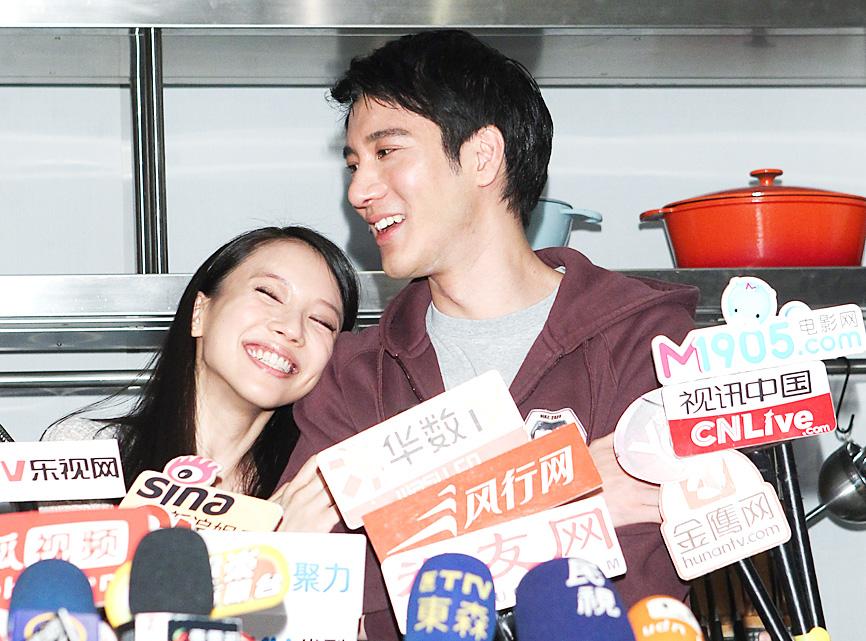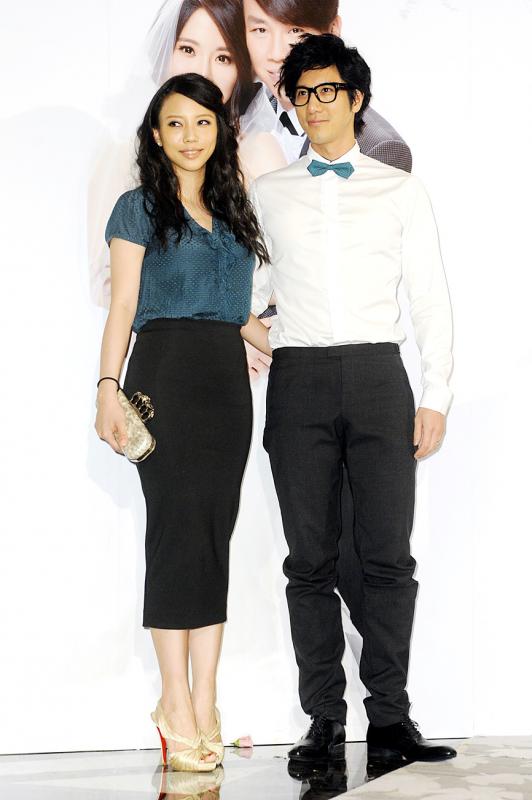Three Chinese companies yesterday canceled their partnerships with Taiwanese-American singer-songwriter Wang Leehom (王力宏) after his wife, Lee Jing-lei (李靚蕾), on Friday accused him of having extramarital affairs.
On Wednesday, Wang wrote on Facebook that he and his wife of eight years had filed for divorce.
“We have different ideas and plans for our future, so we decided to separate. Although we have filed for divorce, we will always be family,” Wang wrote. “I regret not doing enough in our marriage these past few years.”

Photo: Wang Wen-lin, Taipei Times
Lee in a lengthy social media post said Wang had been openly having affairs and sex with prostitutes, adding that he had pressured her into accepting a divorce to protect the reputations of the women he was seeing.
Lee also said that members of Wang’s family had emotionally abused her.
Automaker Infiniti’s China subsidiary yesterday said in a statement that it was, “effective immediately, terminating its partnership with Wang.”

Photo: Sean Chao, Taipei Times
The move came just one day after Infiniti said Wang would act as its brand ambassador.
Electronics company Dushulang also said it would terminate its contract with Wang.
Chow Tai Seng Jewelry said that its contract with Wang ended on Nov. 30, and that it would not consider renewing the partnership.
In her post, Lee, a graduate of Princeton and Columbia universities, said Wang pressured her into a life where she eventually chose to give up her career.
She said that when they first met, Wang, then 26, had pursued her even though she was 16 and Lee was in a relationship with another woman.
Wang yesterday arrived in Taiwan from Beijing and did not comment on the accusations before entering mandatory quarantine.
Wang, 45, and Lee were married in the US in November 2013. They have three children.
Wang’s career started when he released his first Mandopop album in Taiwan in 1995. He has since released 15 albums, written and produced songs for others, and acted in several movies.
Wang has won four Golden Melody Awards — Taiwan’s top music awards — two for Best Singer and two for Best Album Producer.

The Ministry of Foreign Affairs (MOFA) yesterday voiced dissatisfaction with the Comprehensive and Progressive Agreement for Trans- Pacific Partnership (CPTPP), whose latest meeting, concluded earlier the same day, appeared not to address the country’s application. In a statement, MOFA said the CPTPP commission had "once again failed to fairly process Taiwan’s application," attributing the inaction to the bloc’s "succumbing to political pressure," without elaborating. Taiwan submitted its CPTPP application under the name "Separate Customs Territory of Taiwan, Penghu, Kinmen and Matsu" on Sept. 22, 2021 -- less than a week after China

THE GOOD WORD: More than 100 colleges on both sides of the Pacific will work together to bring students to Taiwan so they can learn Mandarin where it is spoken A total of 102 universities from Taiwan and the US are collaborating in a push to promote Taiwan as the first-choice place to learn Mandarin, with seven Mandarin learning centers stood up in the US to train and support teachers, the Foundation for International Cooperation in Higher Education of Taiwan (FICHET) said. At the annual convention of the American Council on the Teaching of Foreign Languages held over the weekend in New Orleans, Louisiana, a Taiwan Pavilion was jointly run by 17 representative teams from the FICHET, the Overseas Community Affairs Council, the Steering Committee for the Test of Proficiency-Huayu, the

A home-style restaurant opened by a Taiwanese woman in Quezon City in Metro Manila has been featured in the first-ever Michelin Guide honoring exceptional restaurants in the Philippines. The restaurant, Fong Wei Wu (豐味屋), was one of 74 eateries to receive a “Michelin Selected” honor in the guide, while one restaurant received two Michelin stars, eight received one star and 25 were awarded a “Bib Gourmand.” The guide, which was limited to restaurants in Metro Manila and Cebu, was published on Oct. 30. In an interview, Feng Wei Wu’s owner and chef, Linda, said that as a restaurateur in her 60s, receiving an

Kaohsiung Mayor Chen Chi-mai (陳其邁) on Monday announced light shows and themed traffic lights to welcome fans of South Korean pop group Twice to the port city. The group is to play Kaohsiung on Saturday as part of its “This Is For” world tour. It would be the group’s first performance in Taiwan since its debut 10 years ago. The all-female group consists of five South Koreans, three Japanese and Tainan’s Chou Tzu-yu (周子瑜), the first Taiwan-born and raised member of a South Korean girl group. To promote the group’s arrival, the city has been holding a series of events, including a pop-up